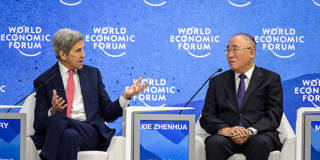The state of the global commons is too serious a matter to be held hostage to permanent political feuding. To mount an effective response to climate change, biodiversity loss, pandemics, and other challenges, China and the United States must figure out how to thread the thinnest of needles.
PARIS – On the same day that the Intergovernmental Panel on Climate Change published its latest report on the urgent need for climate action, Chinese President Xi Jinping visited Russian President Vladimir Putin in Moscow. There, the two leaders issued a statement criticizing the West and emphasizing their intention to deepen the Sino-Russian strategic partnership.
It was a revealing coincidence, highlighting the extreme tension in today’s international relations. On one hand, preserving global public goods – such as the climate and biodiversity, as well as institutions and procedures to prevent future pandemics – requires urgent coordinated action. On the other hand, geopolitical fragmentation and the intensifying Sino-American rivalry are making coordination increasingly difficult.
Such tension is not entirely unprecedented. Admittedly, geopolitical rivalry between the United States and the Soviet Union did not prevent the two Cold War powers from cooperating to prevent a direct confrontation and curtail nuclear proliferation. But the hierarchy of issues was not the same back then. When the post-World War II order was conceived, the focus was not on managing the global commons, but rather on fostering economic ties through trade and investment, in the hope that this would strengthen political alliances. Preventing climate change, preserving biodiversity, and avoiding the depletion of high-sea fisheries were not on anyone’s radar.

PARIS – On the same day that the Intergovernmental Panel on Climate Change published its latest report on the urgent need for climate action, Chinese President Xi Jinping visited Russian President Vladimir Putin in Moscow. There, the two leaders issued a statement criticizing the West and emphasizing their intention to deepen the Sino-Russian strategic partnership.
It was a revealing coincidence, highlighting the extreme tension in today’s international relations. On one hand, preserving global public goods – such as the climate and biodiversity, as well as institutions and procedures to prevent future pandemics – requires urgent coordinated action. On the other hand, geopolitical fragmentation and the intensifying Sino-American rivalry are making coordination increasingly difficult.
Such tension is not entirely unprecedented. Admittedly, geopolitical rivalry between the United States and the Soviet Union did not prevent the two Cold War powers from cooperating to prevent a direct confrontation and curtail nuclear proliferation. But the hierarchy of issues was not the same back then. When the post-World War II order was conceived, the focus was not on managing the global commons, but rather on fostering economic ties through trade and investment, in the hope that this would strengthen political alliances. Preventing climate change, preserving biodiversity, and avoiding the depletion of high-sea fisheries were not on anyone’s radar.